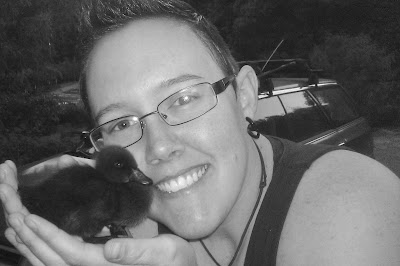Happy valley sounds like a great place to have a farm right? In reality it's actually a pretty populated area. We got lucky to find a house with a decent sized back yard, so we decided to try our hand at larger scale farming on a micro scale. You'd be really surprised to discover the quantity of food you can produce in a not so large amount of space! It's been a work in progress, steadily growing, adding more and varied crops each season, and now we are up to 3 ducks and 5 chickens for egg purposes. We have 4 artichoke plants, a grape vine, 2 strawberry "bushes", a variety of herbs, and 3 blueberry bushes that stay each year to produce food for us and we usually have onions and many types of greens like mustards and kale going year round. We've also seasonally grown potatoes, garlic, eggplants, spinach, swiss chard, tomatoes, peas, beans, lettuce, broccoli, leeks, cardoon, amaranth, asian greens, brussels sprouts, and carrots. Our roommates have squash and some other veggies growing in the front yard as well. While not certified, we have been using pretty strict organic gardening methods and have also taken to limiting our watering to a minimum. Luckily Oregon is a perfect place for these kinds of practices because the weather allows the crops to thrive without much extra care.
Fowl Play:
Back when we started the garden and coop we had only 3 chickens. Our current roommates brought their 3 ducks when they moved in. Two chickens and a duck were unfortunately killed by a neighborhood dog that jumped our fence. We obtained two more chicks and they another duckling that we brooded in the house. The remaining adult chicken began to bully the remaining ducks so we had to re-home her. Once the new chicks and duckling were large enough to go outside we introduced them to the outside ducks and all was well for a little while. Then one night we discovered that some unknown creature killed one of the newly placed outside chickens. I had decided not to replace the birds anymore at that point, but then Casey and one of the roommates found a bantam hen running loose around the outside of the local Home Depot! They captured her and brought her home.
A few months later that hen went broody, refused to leave the nestbox as she was determined to hatch any and all other eggs being laid (literally the other birds were standing on her or beside her to lay their eggs in the box.) This hormonal broody state is normal and common with some chickens but can be dangerous for a non breeding hen because she stops eating and drinking and only poops once a day so she can be on the eggs at all times. If the eggs never hatch, she can become broody indefinitely. Therefore she must be "broken" by either letting her hatch a fertile egg(s), giving her some already hatched chicks, or by going through some laborious other practices. We decided to go the cute route and give her two baby chicks to raise. This time we decided to try and not get attached to them in case they became dinner to the local wildlife like their predecessors.
Now you can't just put the chicks in the pen with everyone else, chickens are very territorial and might attack the new "intruders". The actual preferred method of "grafting" chicks onto a hen involves waiting till the middle of the night while the broody hen is asleep on some eggs, reaching into the coop and swapping the eggs out with the chicks right under her. When she wakes up the next morning and voilá! "Her" chicks have hatched. Sounds like something right out of a cartoon, but it works.
It's been really entertaining to watch her mother these two chicks that are obviously not even the same breed. She is a tiny bantam and they are both from a full size breed. They only have half of their adult feathers and are almost the same size as her!
There are two galleries to look at for the photos, The coop build/garden in progress, and the harvest photos:
CLICK HERE FOR PICS
CLICK HERE FOR PICS OF OUR HARVESTED FOOD



